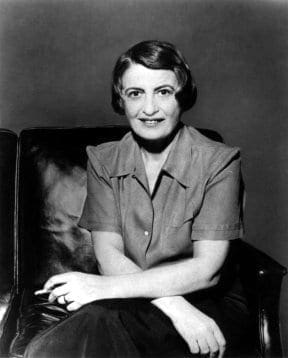Her first was We the Living (1936), chronicling love and the struggle for liberty amidst Soviet oppression. Then came her first big success, The Fountainhead (1943), about a determined individualist pursuing his vision in a collectivist world. The Fountainhead became a bestseller and was made into a movie starring Gary Cooper, Patricia Neal and Raymond Massey. Anthem (1946) is a bold affirmation of individualism. A short novel, it affords an easy introduction to Rand’s ideas. The book goes far beyond more famous anti-authoritarian novels such as Aldous Huxley’s Brave New World (1932), Arthur Koestler’s Darkness at Noon (1941) or George Orwell’s Animal Farm (1945) or Nineteen Eighty-Four (1949). Rand’s most philosophical novel is Atlas Shrugged (1957) which tells what happened when some of the world’s most productive individuals got tired of being exploited and went on strike.
Rand elaborated her philosophy with brilliant essays, gathered in several books: Philosophy Who Needs It?(1962), Capitalism The Unknown Ideal (1962), The Virtue of Selfishness (1964), The Romantic Manifesto (1969), The New Left: The Anti-Industrial Revolution (1971, since reissued as Return of the Primitive) and The Voice of Reason: Essays in Objectivist Thought(1988).
Altogether some 20 million copies of Rand’s books have been sold. In addition, Rand’s associate Harry Binswanger edited The Ayn Rand Lexicon (1986). Ayn Rand Institute Executive Director Michael S. Berliner edited Letters of Ayn Rand (1995). Claremont Graduate School scholar David Harriman edited Journals of Ayn Rand (1997). The letters and journals give you an inside view of Rand’s creative process which brought the world her astonishing works. These and other efforts have been directed by Rand’s heir, Leonard Peikoff, who has worked hard to maintain the purity of her vision. The most recent book on Rand’s ideas to hit the market, is The Art of Nonfiction: A Guide for Writers and Readers (2001); it is based on a series of informal lectures Rand gave to a select group of friends. Transcripts of lectures have been edited by Robert Mayhew to make the content of this book.
There are some fine books about Rand. Barbara Branden’s biography, The Passion of Ayn Rand, appeared in 1986. Her long-time associate Nathaniel Branden told his story in Judgment Day (1989). Peikoff wrote Objectivism: the Philosophy of Ayn Rand (1991). New York University scholar Chris Matthew Sciabarra’s Ayn Rand, the Russian Radical, published in 1995, placed her ideas in the context of Russian philosophy. Fascinating videos of Rand’s TV interviews are available, too.
The 1997 release of the documentary film Ayn Rand: A Sense of Life brought critical acclaim, and it was nominated for an Academy Award. In May 1999, Showtime aired The Passion of Ayn Rand, starring Helen Mirren as Rand, Peter Fonda as Frank O’Connor, Eric Stoltz as Nathaniel Branden and Julie Delpy as Barbara Branden. As Newsweek reported in a story about Rand, “She’s everywhere.”
(Reprinted with permission from Laissez Faire Books.)
Please note: Ayn Rand didn’t call herself a libertarian — in fact she didn’t like the word (see Nathaniel Branden’s excellent essay on this topic). However, we have found that Objectivists invariably score high libertarian on the World’s Smallest Political Quiz, and their political philosophy is definitely more libertarian than any thing else. The libertarian movement has matured over the years, and we believe it’s likely that she — like Natheniel Branden — would now be comfortable calling herself a libertarian.
Quotable
“The government was set to protect man from criminals and the Constitution was written to protect man from government.”
“The smallest minority on earth is the individual. Those who deny individual rights cannot claim to be defenders of minorities.”





















